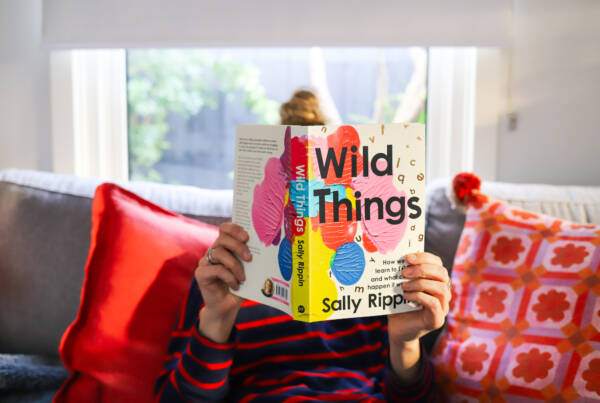Writing by Ellen Muller // Watching Una gave me a much deeper perspective on this Penguin Classic, because Una is given something denied to Lolita, which is the chance for the audience to hear her voice, and to get an impression of her personality separate from the abuser’s perspective. When compared as fictional literary texts, they make a powerful statement why the victim’s perspective is invaluable, without it the story risks being seen as fetishism.
Writing by Ellen Muller
Before I actually read Lolita I presumed it was about a university professor who has an affair with a student. Like many other people who aren’t familiar with Lolita’s narrative, I based my knowledge on references within pop culture. Believing that Lolita‘s intention was to be a seductive/erotic story, and dismissed the controversy surrounding the book when it was first published in 1955, to simply being a reflection of a more conservative time.
It hit me just how upsetting it is that my own initial misinterpretation is so prevalently attached to this story, and almost perpetuated by misleading cover art. Although she is a fictional character, I feel Lolita is owed so much more than to be inaccurately remembered as the ‘seductress’, and a predator who takes advantage of her, views her as. Too often, the fact that Lolita was twelve years old, and the narrator and main character, Humbert, in his thirties (and who details his prior history of fetishizing underage girls) gets omitted from the importance of the story.
Watching the film Una recently, entailing a story of a woman who confronts her abuser as an adult, it dawned on me, years after reading Lolita that we never truly hear Lolita’s perspective on what happened to her. The novel is titled Lolita, yet she is virtually absent in a story describing four years of her life, because it’s written from Humbert’s perspective.
The absence of Lolita’s thoughts and voice means the story is never complete. We don’t know the full details of Lolita’s relationship with her mother Charlotte, who describes her daughter as a ‘pest’ and a ‘miserable brat’. And who remarkably, after reading Humbert’s journal and discovering his desire for Lolita, is more upset by the revelation that he doesn’t love her. We don’t know whether Lolita felt vulnerable, isolated or frightened travelling across America for two years with Humbert after her mother’s death, deluding that she had ‘absolutely nowhere else to go’. We’re given glimpses, such as Humbert stating that she cries ‘every night—the moment I feigned sleep’, or the scene where years after escaping from Humbert, the seventeen year old, married and pregnant Lolita tells him where she went. And yet these moments are all still from Humbert’s point of view.
Whilst watching Una, I couldn’t help drawing comparisons between the two stories . Both, despite being fictitious, are dealing with a subject-matter that is a harrowing reality for countless victims. The idea explored in Una of a victim years later, telling their abuser the emotional damage they caused them, reminded me that one of the most celebrated pieces of literature from the 20st century has clear parallels and yet continuously gets labelled a story of seduction. I wonder if the failure to recognise Lolita as a rape victim is partly due to our society only ever knowing her through Humbert’s eyes, without hearing how she felt.
Although Una and Lolita were written decades apart, they share noticeable similarities, particularly in regards to representing the mentality of an abuser. Like Humbert, who is initially a tenant in Lolita’s home and later her step-father, Una’s abuser Ray (Ben Mendelsohn) is also already familiar to her family as their neighbour. Humbert states, he has ‘the utmost respect for ordinary children’ and that it’s Lolita’s inherent ‘nymphet’ quality which makes her somehow distinct. Similarly, throughout the film, Ray stubbornly repeats that it was only ever Una. That she had qualities which made her ‘wise beyond [her] years’ and in his mind this makes him morally superior to the average paedophile – ‘I was never one of those’.
Falsely perceived consent based on these kind of tainted justifications, shows a significant resemblance between Humbert and Ray. In the case of Lolita, it regrettably remains subject to debate amongst literary interpretations. Una (Rooney Mara/Ruby Stokes), is thirteen during her three month ‘relationship’ and like Lolita, she initially has a crush on her abuser. During the confrontation between the adult Una and Ray, he justifies himself by putting the onus back onto Una, maintaining that she pursued him, they ‘both knew the risk’ and ‘you made me believe I loved you’.
Ray’s justifications are eerily similar to those which have become tied to Lolita, implying that because she had an infatuation with Humbert in the beginning this somehow discredits the fact that she is a twelve year old girl. Lolita’s character diverges from Una, in that Humbert could further validate his actions because she’d had prior sexual experiences with people her own age, proclaiming ‘I wasn’t even her first lover’. Again however, when one reads Lolita it’s a vital detail that this is Humbert’s point of view, utterly devoid of the victim’s voice. As the reader, we don’t know Lolita’s personal background or emotional state. And yet we are separate from the protagonist and should be able to recognise that even if Lolita had previous sexual experiences, this doesn’t suddenly make it ok that her stepfather took advantage of her.
Watching Una gave me a much deeper perspective on this Penguin Classic, because Una is given something denied to Lolita, which is the chance for the audience to hear her voice, and to get an impression of her personality separate from the abuser’s perspective. When compared as fictional literary texts, they make a powerful statement why the victim’s perspective is invaluable, without it the story risks being seen as fetishism.
[I didn’t mention Stanley Kubrick’s 1962 film adaptation of Lolita because it’s quite dissimilar the novel. It doesn’t include many of the details of the novel, and Lolita’s age is changed to 15-16 years old. Frankly it’s a whole other article…]






